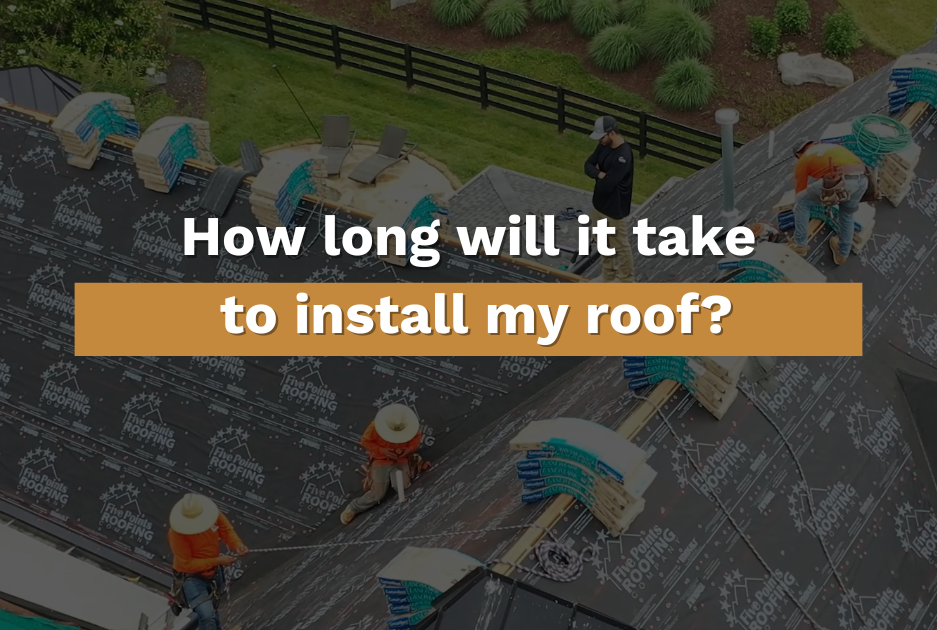
Key Takeaways
The timeline for roof installation depends on factors like weather, roof size, complexity, and materials used. Most projects take 1-5 days, with asphalt shingles (1-3 days) being the fastest and slate or concrete tiles (6-10 days) taking the longest. Tennessee’s hot summers and severe weather can affect timing, with spring and fall being ideal for installations. While DIY may seem faster, professional roofing contractors ensure efficiency and safety. Costs vary by material, with asphalt shingles ranging from $4,500 to $18,500 and metal roofs between $5,800 and $17,500. Hiring a licensed, experienced contractor ensures a timely and high-quality roof installation.
How Long Will My Roof Installation Take?
One of the first questions clients ask is: “How long will my roof installation take?” Many factors contribute to the time it takes to complete a roofing installation. The timeline depends on factors such as the size of the home, the type of roofing material, and even the weather. While most roofing projects are completed in one to five days, conditions like complex roofs, weather delays, or specialized materials like metal roofing may extend this timeline.
In Tennessee, the combination of hot summers and severe weather makes timing critical when replacing an old roof. In this guide, we’ll explore what to expect from the installation process, including details on the best roofing materials for your home, roof replacement costs, and critical steps involved in the installation process. We’ll also cover why hiring a professional roofing company ensures your roof is installed safely and efficiently.
Factors That Impact Roof Installation Time
The duration of an installation depends on several factors:
-
Weather Conditions
-
Roof Size and Complexity
-
Roofing Materials
-
Contractor Expertise
The average roofing installation job takes one or two days. However, three primary considerations impact the total completion time of a project. The project estimate should include each of these factors. While some homeowners consider DIY roof installation to save time and money, it often leads to longer completion times and potential risks, making professional help preferable.
1. Weather:
Adverse weather conditions, such as heavy rain, snowfall, hail, or strong winds, can increase the time needed to complete any home improvement project. Unfavorable weather can add a few extra days to a roof installation. The best conditions include mild temperatures, ranging from 60° to 75° F, with no precipitation. Ideal times of the year for roof installation process include spring, summer, and early fall because of the ample daylight.
Pro Tip: If your schedule is flexible, aim to have your roof installed during Tennessee’s spring or early fall months when the weather is more moderate. These seasons provide the most consistent working conditions and longer daylight hours, which help speed up the process.
2. Roofing Materials:
Different roofing materials require different installation methods. Certain materials will require a lengthier installation timeline. Here’s a breakdown of the most common materials and their timeframes:
Asphalt Shingles (1 to 3 Days)
Asphalt shingles are the most common material due to their affordability and ease of installation. These shingles are lightweight, relatively easy to handle, and can be installed quickly. If you’re looking for a fast turnaround, asphalt shingles are your best bet, as many homes with simple roof designs can be completed in one to three days.
Cost in Tennessee: The average cost for asphalt shingle roof installation in Tennessee ranges from $4,500 to $18,500 for a 2,000-square-foot home, depending on the quality of the shingles and local labor rates.
Metal Roof (2 to 5 Days)
Metal roofing is another popular choice in Tennessee due to its durability, energy efficiency, and resistance to severe weather. However, metal roofs take longer to install than asphalt shingles due to the precision required. Panels must be carefully aligned and fastened; installation often involves specialized tools. This increases both the time and cost of the project.
Cost in Tennessee: A metal roof costs between $5,800 and $17,500, depending on the material and complexity. The more expensive standing seam option can push costs higher.
Slate or Concrete Tiles (6 to 10 Days)
Slate or concrete tiles are excellent options for a premium, long-lasting roofing material. However, these materials are heavier and more labor-intensive to install. Workers must take extra care when handling the tiles to avoid cracks or chips, and the roof structure may require reinforcement to support the added weight.
Cost in Tennessee: Slate roofs range from $5,400 to $23,000, depending on the size and intricacy of the roof design. Slate and concrete tiles offer unparalleled durability but require significantly longer installation times.
Proper roofing nails are essential for securing asphalt shingles and slate tiles, ensuring a durable and long-lasting installation.
New Roof Installation Size:
Installing a roof on a one-bedroom cottage will be quicker than installing one on a palatial mansion. The project estimate will include a timeframe that depends on your home’s square footage and dimensions. Beware of roofing companies that quote a one-day turnaround on a complex project. A rushed, low-quality new roof installation won’t serve you well in the long run, so enlist a reputable roofer’s services.
3. Size and Complexity of Your Roof
The size and design of your roof are significant determinants of the installation timeline. A larger roof requires more materials and labor, extending the project duration naturally. Likewise, complex roof designs, such as those with multiple peaks, valleys, or unusual angles, take longer to install than simpler, single-pitch roofs. Homes with multiple stories or intricate architectural features may also require scaffolding, further slowing the installation process.
For example, a single-story ranch home with a straightforward roof design may take just one or two days for asphalt shingles, while a two-story home with a complex roof featuring dormers, chimneys, and valleys could take a week or longer. For flat roof installations, typically seen on commercial properties, the process may be quicker due to the simpler design, but it could be extended if drainage systems or other specialized features are required.
4. Contractor Expertise
Your roofing contractor’s skill and experience level can significantly influence the length of the project. A well-established, experienced contractor will typically work more efficiently while maintaining a high-quality standard. Conversely, less experienced or understaffed crews may take longer to complete the job, sometimes leading to errors or rework, adding to the total project time.
When selecting a contractor in Tennessee, it is essential to choose one with a solid reputation for delivering quality work on time. Look for companies that are licensed, insured, and have positive reviews from previous customers. A good contractor will provide an accurate estimate and inform you about the project’s progress throughout the installation.
Roofing Project Overview
The roof installation process involves several critical steps that require attention to detail and adherence to safety precautions and regulations. Each step is vital to ensure the integrity and longevity of the new roof. Understanding the roofing project timeline is crucial to ensure a smooth and successful process. By familiarizing yourself with each phase, you can better manage expectations and ensure every step is completed efficiently and effectively.
Roofing Project Timeline
The roofing project timeline typically includes the following stages:
-
Planning and Preparation: This initial stage involves assessing the roof’s condition, determining the scope of work, and selecting the appropriate roofing materials. It’s essential to evaluate the current state of your roof and decide on the best materials for your needs, whether it’s asphalt shingles, wooden shingles, or another type of roofing material.
-
Pre-Installation: Before the actual installation begins, the site must be prepared. This includes removing the old roof (if necessary) and inspecting the roof decking to ensure it’s in good condition. Any necessary repairs to the decking should be made at this stage to provide a solid foundation for the new roof.
-
Installation: This stage involves installing the new roofing material. This process includes laying the underlayment, installing starter shingles, and adding the final roofing layers. Each step must be performed precisely to ensure a durable and long-lasting roof.
-
Final Inspection: Once the installation is complete, a thorough inspection is conducted to ensure the new roof meets all required standards and is free from defects. This final step is crucial to verify the quality of the work and address any potential issues before they become problems.
1. Planning and Preparation
Planning and preparing carefully before starting the project is essential to ensure a successful outcome. Proper planning sets the stage for a smooth and efficient installation process. Roofing contractors must follow strict safety guidelines to prevent accidents and ensure a safe working environment. For instance, in some regions with extreme weather, building codes may call for self-adhesive waterproof underlayment, known as an ice barrier. Some of the vital safety precautions include:
-
Wearing Personal Protective Equipment (PPE): This includes hard hats, safety glasses, gloves, and other protective gear to safeguard against potential hazards.
-
Ensuring Proper Ladder Safety and Fall Protection: Proper use of ladders and fall protection systems is essential to prevent falls and injuries. Contractors must be trained in ladder safety and use harnesses and guardrails as needed.
-
Following Electrical Safety Guidelines: Contractors must adhere to electrical safety protocols to avoid shocks and other electrical hazards when working with power tools and equipment.
-
Maintaining a Clean and Organized Workspace: Keeping the work area tidy helps prevent tripping hazards and allows for a more efficient workflow. A clean site also reduces the risk of accidents and injuries.
Pro Tip: The cost of replacing a roof in Tennessee typically ranges from $7,800 to $25,000, depending on the materials used and the roof size. To protect your investment, be sure to ask about the available warranty options at this stage.
In most cases, the existing roof must be removed before the new one can be installed. This process can take one to two days, depending on how many layers of old roofing need to be stripped away. In some cases, if the roof structure is in good condition and has only one existing layer, a new roof can be installed on top of the old one, but this option depends on local building codes and the condition of your roof deck.
The pre-installation checklist includes the following tasks:
-
Inspecting the Roof Decking: Ensure the roof decking is in good condition and can support the new roofing material. Any damaged or weak areas should be repaired or replaced.
-
Removing the Old Roofing Material: If necessary, the old roof must be removed and the debris properly disposed of. This step is crucial to providing a clean slate for a new roof.
-
Installing the Drip Edge and Underlayment: These components provide a watertight seal and protect the roof from moisture. The drip edge is installed along the edges of the roof, and the underlayment is laid before the roofing material.
-
Obtaining Necessary Permits and Approvals: Ensure all required permits and approvals are obtained before starting the project. This step is essential to comply with local building codes and regulations.
-
Selecting the Right Roofing Materials: Choose the appropriate roofing materials, such as asphalt shingles, and ensure they meet the required standards. The suitable materials will contribute to the durability and longevity of the new roof.
-
Hiring a Professional Roofing Contractor: Enlist the services of a reputable and experienced professional roofing contractor. A skilled contractor will ensure the project is completed to the highest standards.
-
Scheduling a Final Roof Inspection: Plan for a final roof inspection to verify that the completed roof meets all required standards and is free from defects. This step ensures the quality and integrity of the new roof.
Once the old roof has been removed, the contractor will inspect the decking (the wooden base beneath the shingles) for damage or rot. If repairs are necessary, this can add extra time to the project, but it’s crucial to ensure the roof’s foundation is in good condition before the new materials are installed.
Installation: Laying the New Roof
The installation phase is where the majority of the work takes place. Depending on the material chosen, this phase can take anywhere from one day to over a week. Here’s a breakdown of what you can expect:
-
Asphalt Shingles: After the underlayment and any necessary flashing are installed, the shingles are nailed in place, starting from the bottom edge of the roof and working upward. This process typically takes one to three days.
-
Metal Roofing: Metal panels are laid down precisely, as each piece must interlock correctly to prevent leaks. Fasteners and screws are used to secure the panels, which can take two to five days.
-
Slate or Concrete Tiles: Each tile is carefully placed and fastened, a labor-intensive process due to the material’s weight and fragility. This process should take between six and ten days.
4. Final Inspection and Clean-Up
After the installation, your contractor will perform a final inspection to ensure everything is up to code and meets safety standards. This step is critical to validating your roof’s warranty and ensuring the work was done correctly. The crew will also clean up the job site, removing any debris, nails, or leftover materials and leaving your property in pristine condition.
How Much Does a New Roof Cost in Tennessee?
The cost of a new roof in Tennessee depends on several factors, including the type of material, the size of the roof, and labor costs. Here’s a breakdown of estimated costs based on different materials:
-
Asphalt Shingles: $4,500 – $18,500 for a 2,000 sq. ft. home.
-
Metal Roofing: $5,800 – $17,500 for a 2,000 sq. ft. home.
It’s important to note that these are average price ranges, and the final cost may vary depending on local labor rates, the complexity of your roof, and any additional features like skylights or ventilation systems.
Getting Accurate Estimates
For a more accurate estimate, getting quotes from several local roofing companies is always best. Many companies offer free estimates, giving you a clearer idea of the costs involved. During the estimate process, contractors can also help you determine which roofing material best suits Tennessee’s climate and your home’s needs.
Roofing Installation with Warranty in Tennessee
Investing in a roof is a significant expense, and protecting that investment with a warranty is important. Most roofing companies in Tennessee offer warranties that cover both materials and workmanship. Material warranties can last anywhere from 20 to 50 years, depending on the manufacturer and the type of roofing material. Workmanship warranties, which cover the labor involved in the installation, are typically shorter, ranging from five to ten years.
Before selecting a contractor, review the warranty options they offer and ask any questions you may have. A reputable contractor will stand behind their work and provide you with peace of mind, knowing that your new roof is covered in case of defects or other issues.
The Importance of Hiring Professional Roofing Contractors
Installing a new roof is a significant investment, and it’s not a project you want to tackle with a DIY roof installation. While DIY might seem appealing, improper installation can lead to roof repairs down the line, costing you more in the long run. Professional contractors have the expertise and equipment to safely and effectively complete the installation.
A professional roofing company will also dispose of old roofing materials, manage potential issues like falling debris, and ensure the roof installed meets all local building codes.
Professional Roofing Contractors Ready for Any Project
For more than 25 years, Five Points Roofing has been the leading roofing professionals in Nashville, Franklin, Brentwood, Murfreesboro, and the surrounding areas. There’s a good reason why we’ve been the best for so long—we take our jobs seriously and never compromise on quality, customer service, or affordability. Our HAAG-certified residential roofing team has more than 75 years of combined experience. Regardless of the project size, we give our all to achieve great results.
Conclusion
The timeline and cost of roof installation in Tennessee depend on several factors, including weather conditions, the type of material used, the size and complexity of the roof, and the contractor’s expertise. Asphalt shingles offer the quickest and most affordable option, while metal roofing and slate tiles provide superior durability but require a longer installation time.
If you’re planning a roofing installation, be sure to choose a reputable local contractor with experience handling Tennessee’s unique climate demands. They can help ensure that your roof is installed correctly and on time, providing a long-lasting, reliable solution for your home. For specific pricing and scheduling, it’s best to contact a local contractor like Five Points Roofing to get a free estimate tailored to your needs.
Schedule Your Roof Installation Process Today
If you want to learn more about how long your new roof installation might take or are just curious if it is even time for a new roof, our team can help. We would happily provide information about the process, estimated costs, time frames, and more. Plus, with complimentary inspections, now is the time to consider roof replacement and repair. If your roof installation process involves an insurance claim, please note this during the consultation.




